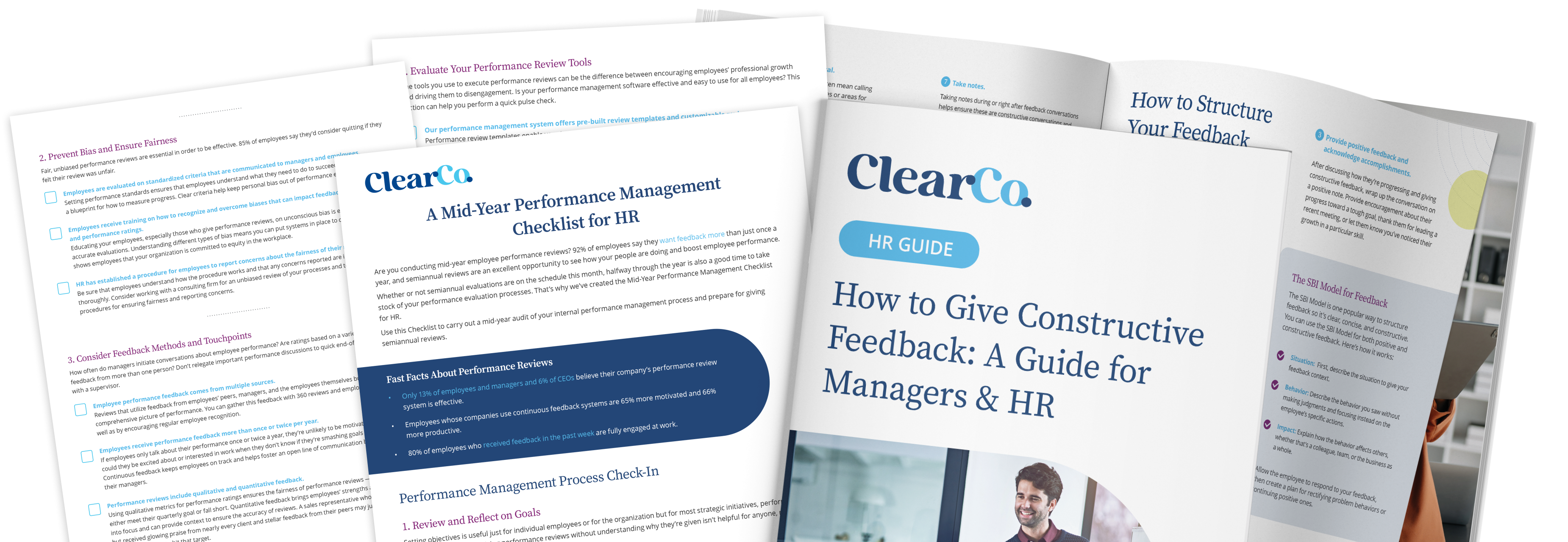Artificial intelligence (AI) has quickly made its mark since the release of ChatGPT. Less than two years later, 75% of knowledge workers around the world use generative AI, saying it saves them time and even helps them be more creative. Human resources decision-makers share that optimistic view, with 61% saying they expect AI to have a positive impact on HR processes over the next five years. Despite their positive outlook, only 38% of HR leaders said they were currently using AI tools at work.
That could be due to a variety of reasons, including a lack of understanding of how to use AI in HR or skepticism about its effectiveness — but those who are using AI have found it to be transformative across HR functions. Those functions include performance management, which has gone through a transformation of its own in recent years. The annual performance review has been foregone and (in some cases) reintroduced; managers are giving more timely feedback; and companies are increasing their focus on learning and development.
Now, AI is making its mark on performance management, too. With the rise of AI use in HR, it’s important to stay up-to-date on how it’s being used and its potential for the future. Let’s take a look at AI in performance management today so you can keep up with what’s happening now and prepare for what’s next.
7 Uses for AI in Performance Management
Traditional methods of managing performance are out, and new performance management processes are in. Employees want real-time feedback, a supportive manager, and opportunities to grow professionally. They want clear expectations, frequent recognition, and formal performance reviews that are focused on the future.
AI can help you deliver a personalized performance management strategy that actually helps your people improve. Let’s take a look at some of the ways AI is already at work in performance management.
1. Monitoring Employee Performance
With an AI-enhanced performance management system, you can easily monitor how employees are doing company-wide and by department as well as track individual performance. As employees update their goal progress, AI keeps an eye on performance metrics and can alert you if they’re not on track to meet the target metrics. Then, you can take immediate action, looking into what’s causing performance issues and providing support to help every employee do their best and meet their goals.
2. Goal-Setting Assistance
Setting goals is crucial for performance management —it’s impossible to accurately gauge performance without an objective to measure it against. But you can’t set goals arbitrarily, either. That’s where the benefits of using AI come in.
Powerful AI performance management tools can analyze past performance data from any subset of team members and make recommendations for goal targets. They can even take industry conditions into account to help you set SMART goals that help the business reach its goals.
3. Managing Performance Review Cycles
With AI, performance review management is a much less daunting task. AI can help you create a regular cadence or cycle for your review process to help you balance formal and informal evaluations. During a formal review cycle, it can automatically send reviews and even send reminders to managers and individual employees so reviews are completed on time.
4. Giving Better Feedback
Giving constructive feedback specific to each team member is no easy task. No doubt, it’s one of the reasons the performance review process can be so time-consuming — and likely why only 5% of employees say they’re getting helpful feedback. Managers want to provide accurate, personalized performance feedback, but analyzing months of data and scraping emails and Slack messages for mentions of each employee just isn’t realistic.
So, what can help out in this situation? You guessed it — AI.
AI tools can quickly aggregate employees’ performance data, including any recognition they received from colleagues. While we don’t recommend writing performance review feedback entirely with AI, it can certainly help you get started. AI can even help you formulate plans for how to help employees continue improving after their reviews.
Give feedback that motivates your employees and helps them improve. Download ClearCompany’s Guide to Giving Constructive Feedback to learn more.
Get the Guide5. Planning Employee Development
If you’re like many HR teams, enabling employee learning is a top priority for you this year. Employees want learning opportunities, and they’re looking for new jobs if they don’t get it. Luckily, AI can help you design tailored learning programs that cater to employees’ unique goals and learning styles.
With insight into the performance of your entire workforce, your business’s goals, and each individual’s strengths, AI can provide suggestions for how to develop each employee. For example, you might have a top customer service agent who designed and implemented several time-saving processes in their department. The agent is also a mentor who frequently assists colleagues and eagerly volunteers when there’s an opportunity to give a presentation.
Though it may seem obvious this person is suited for a leadership role, AI helps you turn this realization into action. AI performance management tools can:
- Outline the steps the employee needs to take to move into the leadership role, like earning a certification or passing an aptitude test.
- Highlight any areas for improvement that may hold the person back so they can be addressed prior to taking on the new role.
- Create a personalized learning path the employee can follow to bolster their strengths and strengthen their weaknesses.
- Understand the employee’s learning style for recommendations that are tailored to their needs.
6. Skill Gap Analysis
To develop employees in a way that also benefits the business, you need to understand the skills your team has in abundance, as well as the skills they lack or need to improve. AI can quickly analyze performance data and find skill gaps within the team or with individual employees — information that can give you even more insight.
For example, you might find that an entire department lacks an important skill due to an oversight in their onboarding training, which you can then correct. Or, you thought you’d need to hire a new software engineer who has experience with an older programming language, but your AI performance management tool helps you identify two engineers who worked with that language.
Turns out, they just needed a few refresher courses to polish their skills. You save the time and expense of hiring, your employees are motivated by the investment in their growth, and the skill gap gets filled.
7. Predictive Analytics
Thanks to their ability to analyze massive amounts of data at inhuman speed, AI-powered performance systems can help you see the future — or at least make some very informed assumptions about it. With a more accurate picture of the future, you can better plan for it. Here’s a situation where AI’s predictive capabilities come in handy.
Imagine that your HR team’s goal for the year is to improve employee retention on the software engineering team, and you implement an AI-powered performance management system to help. The AI system evaluates all the relevant data from that team so it can spot any patterns that may be contributing to higher turnover. For example, it might find that team members are more likely to quit if their manager hasn’t provided positive feedback in the past month.
With that data, AI can predict which members of the software engineering team are at the highest risk of quitting. It can even consider other factors like performance review scores, goal completion, and employee engagement levels. Now, you have a list of employees who are at risk of quitting, including the factors that may be impacting them.
From there, you can take action to address each employee's specific concerns. If one engineer is a top performer but shows signs of disengagement, they may benefit from more one-on-one coaching from their manager. Another employee is highly engaged, but their performance isn’t meeting expectations. Your approach with that employee could be to offer some extra training to help them meet their goals.
Responsible AI in Performance Management
As useful and powerful as it is, artificial intelligence tools are not perfect. AI use, especially in such people-centric areas of the business as HR, should be carefully monitored and managed by humans. You should also ensure that your AI-enhanced performance management system — and any other AI-enhanced systems you use — have processes for the responsible development of their product.
Be sure to follow best practices for implementing AI in HR to mitigate risk and get the most from your tools:
- Define your goals.
- Know the risks.
- Ensure the system utilizes recent, accurate data.
- Train your team.
- Monitor and evaluate AI-enhanced systems for efficacy.
Read more about how HR is using AI technology to streamline workflows, save time, and focus on their people.


.png)
